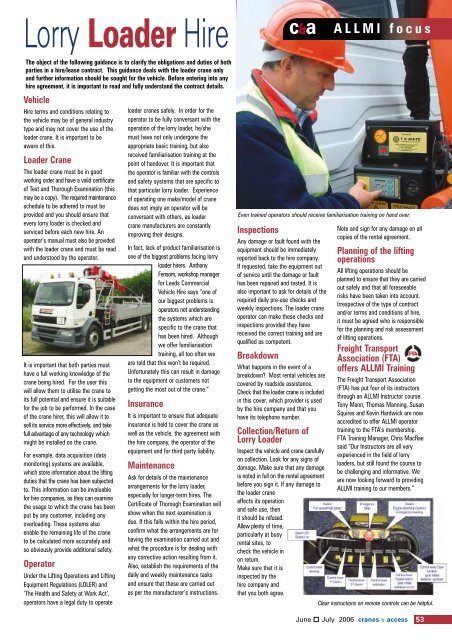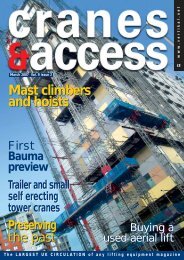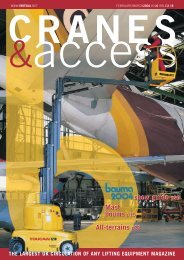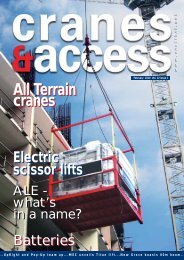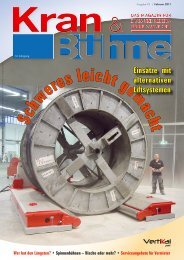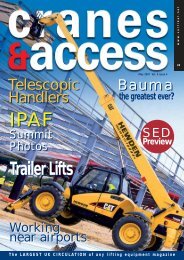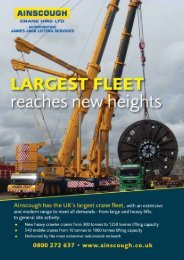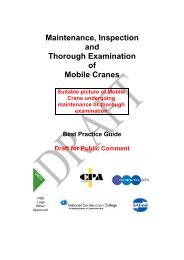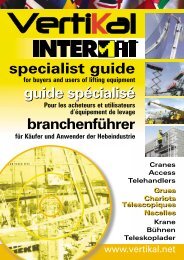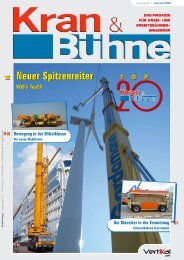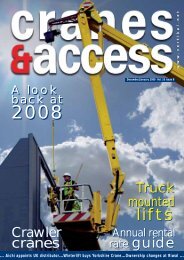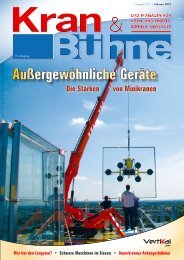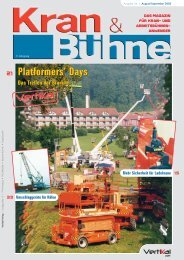Create successful ePaper yourself
Turn your PDF publications into a flip-book with our unique Google optimized e-Paper software.
Lorry Loader Hire<br />
The object of the following guidance is to clarify the obligations and duties of both<br />
parties in a hire/lease contract. This guidance deals with the loader crane only<br />
and further information should be sought for the vehicle. Before entering into any<br />
hire agreement, it is important to read and fully understand the contract details.<br />
Vehicle<br />
Hire terms and conditions relating to<br />
the vehicle may be of general industry<br />
type and may not cover the use of the<br />
loader crane. It is important to be<br />
aware of this.<br />
Loader Crane<br />
The loader crane must be in good<br />
working order and have a valid certificate<br />
of Test and Thorough Examination (this<br />
may be a copy). The required maintenance<br />
schedule to be adhered to must be<br />
provided and you should ensure that<br />
every lorry loader is checked and<br />
serviced before each new hire. An<br />
operator’s manual must also be provided<br />
with the loader crane and must be read<br />
and understood by the operator.<br />
It is important that both parties must<br />
have a full working knowledge of the<br />
crane being hired. For the user this<br />
will allow them to utilise the crane to<br />
its full potential and ensure it is suitable<br />
for the job to be performed. In the case<br />
of the crane hirer, this will allow it to<br />
sell its service more effectively, and take<br />
full advantage of any technology which<br />
might be installed on the crane.<br />
For example, data acquisition (data<br />
monitoring) systems are available,<br />
which store information about the lifting<br />
duties that the crane has been subjected<br />
to. This information can be invaluable<br />
for hire companies, as they can examine<br />
the usage to which the crane has been<br />
put by any customer, including any<br />
overloading. These systems also<br />
enable the remaining life of the crane<br />
to be calculated more accurately and<br />
so obviously provide additional safety.<br />
Operator<br />
Under the Lifting Operations and Lifting<br />
Equipment Regulations (LOLER) and<br />
‘The Health and Safety at Work Act’,<br />
operators have a legal duty to operate<br />
loader cranes safely. In order for the<br />
operator to be fully conversant with the<br />
operation of the lorry loader, he/she<br />
must have not only undergone the<br />
appropriate basic training, but also<br />
received familiarisation training at the<br />
point of handover. It is important that<br />
the operator is familiar with the controls<br />
and safety systems that are specific to<br />
that particular lorry loader. Experience<br />
of operating one make/model of crane<br />
does not imply an operator will be<br />
conversant with others, as loader<br />
crane manufacturers are constantly<br />
improving their designs.<br />
In fact, lack of product familiarisation is<br />
one of the biggest problems facing lorry<br />
loader hirers. Anthony<br />
Fensom, workshop manager<br />
for Leeds Commercial<br />
Vehicle Hire says “one of<br />
our biggest problems is<br />
operators not understanding<br />
the systems which are<br />
specific to the crane that<br />
has been hired. Although<br />
we offer familiarisation<br />
training, all too often we<br />
are told that this won’t be required.<br />
Unfortunately this can result in damage<br />
to the equipment or customers not<br />
getting the most out of the crane.”<br />
Insurance<br />
It is important to ensure that adequate<br />
insurance is held to cover the crane as<br />
well as the vehicle, the agreement with<br />
the hire company, the operator of the<br />
equipment and for third party liability.<br />
Maintenance<br />
Ask for details of the maintenance<br />
arrangements for the lorry loader,<br />
especially for longer-term hires. The<br />
Certificate of Thorough Examination will<br />
show when the next examination is<br />
due. If this falls within the hire period,<br />
confirm what the arrangements are for<br />
having the examination carried out and<br />
what the procedure is for dealing with<br />
any corrective action resulting from it.<br />
Also, establish the requirements of the<br />
daily and weekly maintenance tasks<br />
and ensure that these are carried out<br />
as per the manufacturer’s instructions.<br />
c&a<br />
Inspections<br />
Any damage or fault found with the<br />
equipment should be immediately<br />
reported back to the hire company.<br />
If requested, take the equipment out<br />
of service until the damage or fault<br />
has been repaired and tested. It is<br />
also important to ask for details of the<br />
required daily pre-use checks and<br />
weekly inspections. The loader crane<br />
operator can make these checks and<br />
inspections provided they have<br />
received the correct training and are<br />
qualified as competent.<br />
Breakdown<br />
What happens in the event of a<br />
breakdown? Most rental vehicles are<br />
covered by roadside assistance.<br />
Check that the loader crane is included<br />
in this cover, which provider is used<br />
by the hire company and that you<br />
have its telephone number.<br />
Collection/Return of<br />
Lorry Loader<br />
Inspect the vehicle and crane carefully<br />
on collection. Look for any signs of<br />
damage. Make sure that any damage<br />
is noted in full on the rental agreement<br />
before you sign it. If any damage to<br />
the loader crane<br />
affects its operation<br />
and safe use, then<br />
it should be refused.<br />
Allow plenty of time,<br />
particularly at busy<br />
rental sites, to<br />
check the vehicle in<br />
on return.<br />
Make sure that it is<br />
inspected by the<br />
hire company and<br />
that you both agree.<br />
ALLMI focus<br />
Even trained operators should receive familiarisation training on hand over.<br />
Note and sign for any damage on all<br />
copies of the rental agreement.<br />
Planning of the lifting<br />
operations<br />
All lifting operations should be<br />
planned to ensure that they are carried<br />
out safely and that all foreseeable<br />
risks have been taken into account.<br />
Irrespective of the type of contract<br />
and/or terms and conditions of hire,<br />
it must be agreed who is responsible<br />
for the planning and risk assessment<br />
of lifting operations.<br />
Freight Transport<br />
Association (FTA)<br />
offers ALLMI Training<br />
The Freight Transport Association<br />
(FTA) has put four of its instructors<br />
through an ALLMI Instructor course.<br />
Tony Mann, Thomas Manning, Susan<br />
Squires and Kevin Hardwick are now<br />
accredited to offer ALLMI operator<br />
training to the FTA’s membership.<br />
FTA Training Manager, Chris MacRae<br />
said “Our Instructors are all very<br />
experienced in the field of lorry<br />
loaders, but still found the course to<br />
be challenging and informative. We<br />
are now looking forward to providing<br />
ALLMI training to our members.”<br />
Clear instructions on remote controls can be helpful.<br />
June July 2006 cranes & access<br />
53


